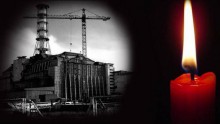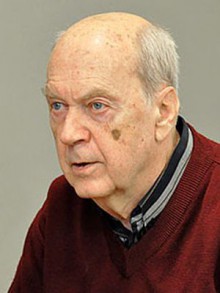Regretfully, Rollan Serhiienko is not a loud name in our cinema. But according to his merits, he is in the first cohort of Ukrainian filmmakers. His films include several fiction films, such as White Clouds, Happiness of Nykyfor Bubnov, debut short films Cards. But most of them are non-fiction films, documentaries, including the ones that I consider masterpieces: Declaration of Love; Reveal Yourself; Vernadsky’s Law; The Bell of Chornobyl; Threshold; Chornobyl. Afterword.
OLEKSANDR DOVZHENKO: “THEY WILL TRAMPLE YOU DOWN”
Serhiienko was born to a family of teachers in Chernihiv oblast. His mother was a daughter of a priest. This explains a lot – both in his destiny and the moral code he has professed through art.
A pupil of Oleksandr Dovzhenko, he studied at the legendary VGIK year, enrolled by the classical director in 1955. Another student from this year Otar Iosseliani (a world classic as well) recalls: “At the end of the year Dovzhenko told me and Serhiienko that we shouldn’t work as directors. Why? ‘They will trample you down,’ Dovzhenko said, ‘You are too delicate.’” They were delicate whereas they needed to be different: go-getting and impudent. But they didn’t listen and become directors, and thank God for this. But Serhiienko must have recalled the advice many times.
For example, when he was removed from the shooting of the film I’m Going to You about Lesia Ukrainka, based on Ivan Drach’s script (the film was later directed by Mykola Mashchenko). Or when the documentary Reveal Yourself dedicated to Hryhorii Skovoroda was banned. In the time of perestroika, in the later 1980s, it was taken from the “shelf” and even awarded with the Shevchenko Prize. However, he needed to overcome all this and not to fall. The reason of this and other bans is the presence of high artistic logic, which was perceived by officials as hardly understood, but evident threat to their existence. As well as the highest moral principles. “Of us all,” director Roman Balaian categorically asserted, “Rollan is the most decent man.”
At the demand to make numerous changes in Reveal Yourself, Serhiienko sent to the State Agency of Cinema an impudent 17-page letter. “You see only letters, but you are unable to make words,” he wrote. That was quite brave at that time. And the priest’s grandson also expressed his outrage with the demand to clean the video sequence of the picture from scenes with churches and cathedrals. The director continued that “they had embodied beauty and perfection for people for centuries, and he received a demand to refuse from all that. Anyway, what kind of demands are these, even for a director who has made more than 10 films? What if a young filmmaker was in my place? You would have broken his spine in such a way.”
“TODAY’S STAKE ON BOURGEOIS PRINCIPLES IS ACTUALLY A STAKE ON ANTI-CHRISTIANITY”
Another student who studied on the same year as Serhiienko in VGIK, Iryna Povolotska, considers that Serhiienko was “the most faithful pupil of Dovzhenko. I have such a feeling. He in some direct meaning accepted his fire.” She was talking above all about the cycle of Serhiienko’s films about Chornobyl tragedy. In fact, the feeling of catastrophe is determining for Dovzhenko’s Ukraine in Flames: our Fatherland is dying bound in the vice of two colossuses. On the whole, this is a regular motif in Serhiienko’s teacher’s works: disappearance of the matter of the national being and actually of life as it is. Another universal fire will destroy us and our life space – and in the morning we will wake up in a different time-space. However, in Dovzhenko’s works this feeling did not become immediately as an emotion of tragedy, whereas in Serhiienko’s films the contemplation over this world outlook collision is present in White Clouds (1968): the son goes to his father who is dying and rethinks his entire life, his own and his family’s, the life that consists only of catastrophes.
One of the characters of the Chornobyl film Threshold Volodymyr Shovkoshytny (later he became a writer, at that time he was one of the liquidators of the catastrophe and a bard) formulates that feeling in a piercingly categorical way: “A fatherland is the place where we were born, gave birth to our children, became parents. We have lost this fatherland. Forever.”
The loss. This feeling haunted Serhiienko for many years after that. He created the Chornobyl cycle: The Bell of Chornobyl; Getting Closer to Apocalypse. Chornobyl is Near; Chornobyl. The Funeral Feast; Chornobyl Afterword. If we not only watched those films, but also listened deeply, maybe the number of tragedies and catastrophes wouldn’t be so high in Ukraine? However, I understand the naivety of such sobbing.
Dovzhenko believed in the coming of a Communist society that would stabilize the social life and balance it with clear and understandable moral instruction. Serhiienko was a believer, so his statement that “the stake on bourgeois principles was basically a stake on anti-Christianity” doesn’t look strange. Evaluating the path he has covered, he can say: “In my soul I was probably a Communist – though I didn’t consider myself one, but I think I defended the idea of Communism, including Christ in this notion as one of the first Communists, and Skovoroda as one of successors of Christ, and ideologists of true Communism.” (From an interview to Larysa Briukhovetska, Cinema. Theater, 2003, No. 2.) Serhiienko is again moving against the current – probably because he remains free and not enslaved. Conscience is his religion. To be yourself and not to forget that the greatest human sin is the profanation of the image of God. This is what the cinematographic Gospel from Rollan is like.








